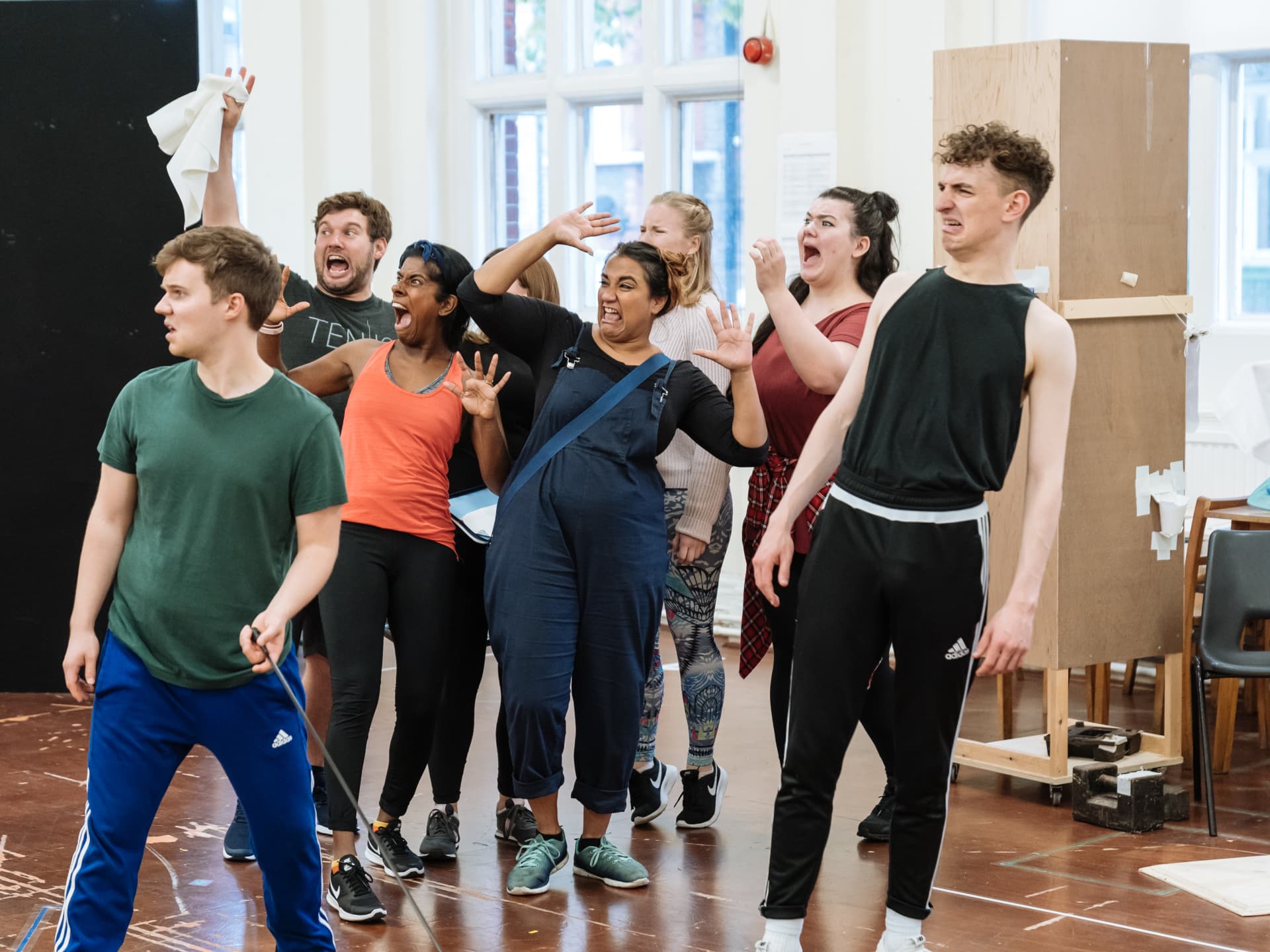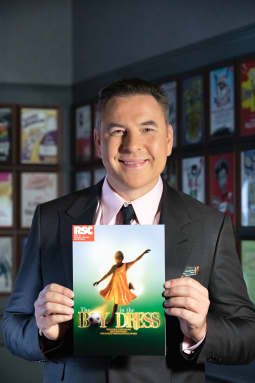David Walliams’ heartwarming comedy is brought to the stage for the first time in a musical with all new songs from Robbie Williams and Guy Chambers, script by former RSC playwright in residence Mark Ravenhill and in a production for all the family directed by RSC artistic director Gregory Doran. During rehearsals, the author spoke to Terri Paddock about his inspiration for The Boy in the Dress, his burgeoning career as a children’s writer and how he feels having his work adapted by the RSC.
The Boy in the Dress was your first children’s novel. Why did you want to write children’s books?
I just had an idea for a story that involved a child. I thought, as a child is the central figure, maybe this would be a good story for children to read and it would be a good story about what it is to be different, which is something you feel a lot as a child.
Was there a particular message you were trying to convey?
It’s quite an adult theme – a boy dressing as a girl – but it’s dealt with in a simple way. I didn’t want to put any labels on Dennis, the boy in the dress. He doesn’t really understand everything that’s going on in the world or what anything means. He’s just Dennis. He wants to be different and to express himself and, in doing so, the world around him changes for the better.
How was writing books different from your television writing?
There’s so much you can do in a book that you can’t do in a comedy sketch – such as telling a story that’s evolving over a period of time and, the biggest thing, giving an emotional life to the characters. I’d never tried to do anything emotional before, I’d only ever tried to make people laugh. Comedy sketches are only two to three minutes long, so there’s not time for that and it wouldn’t be appropriate. In a book, there’s more time and opportunity. I discovered I really liked writing those bits and that maybe I’m good at it. It felt true to me.
I was very affected seeing that first book of mine in print, so beautifully put together with Quentin Blake’s illustration on the cover. Television, as much as I love making it, is quite ephemeral. I know there are DVDs and catch-up, but most of the time, you’re just on television and then the next day, someone’s watching something else. A book has a lot more life, more permanence to it. And they’re beautiful objects in themselves. Because of all that, I really enjoyed the process and it made me want to write more.
And that led to a whole new career as a children’s author.
Yes, I’m doing one novel a year, a novella a year, a book of short stories a year, and a picture book a year. Basically, I’m always writing them. It never ends. As soon as I finish one, I know I’ve got to start the next one.
Your first two children’s books – The Boy in the Dress and Mr Stink – were illustrated by Quentin Blake, whose designs are also referenced in the stage production. What do his illustrations add to your story?
Quentin set a tone for The Boy in the Dress and brought the emotions to the fore. There’s something very tender and sensitive about his illustrations. The other thing about Quentin is, because a lot of us have grown up with his illustrations, it’s like instant nostalgia when we see his work as a grownup. It makes you think of your own childhood.
How did your collaboration with the RSC begin?
I certainly never thought, oh, one day The Boy in the Dress will be a musical with the RSC. About four years ago, Mark Ravenhill asked to adapt it. At that point, he didn’t say that it should be a musical. I thought it was going to be a play version. So I met Mark a few times. I liked him a lot, I liked his work a lot. I thought, well, he’s a proper playwright, it’s brilliant that he wants to do it.
I’d seen all of Mark’s plays – Shopping and F****** (like everyone else), Mother Clap’s Molly House, Some Explicit Polaroids, The Cane. You don’t think of his work as being child-friendly, especially not a play called Shopping and F******. But I knew that he’d know how to make the story theatrical, and there are issues in the book where I thought, where he’s coming from with his previous work, he’ll know how to deal with that in a sensitive way.
Later I met Mark with Greg Doran and they said, oh, we’d like to do it as a musical and ask Robbie Williams and Guy Chambers to write the music. I know Robbie and Guy a bit and I thought, well, you can ask them, I’m not going to ask. When they said, Robbie and Guy are on board, I thought, yeah, well, I’ll believe it when I hear the songs. Then when I came to a workshop and heard 18 incredible songs, I was like, oh, this is real now.
You’ve played a part in adapting a number of versions of The Boy in the Dress. Did you have any qualms letting go here and allowing others to interpret your work?
As an author, I think the only thing you’d be concerned about is if you thought others were changing the meaning of your story in a way that you didn’t intend. Mark has done a brilliant but pretty faithful adaptation. The story that I wrote, the characters that I wrote and some of the lines that I wrote are intact, and the musical is true to the spirit of my book.
Ultimately, the book’s the book and the book will always be there if anyone wants to read it. Each iteration is different in its own way, and anything added is just a plus.
What do Guy Chambers and Robbie Williams in particular bring to The Boy in the Dress?
They’re brilliant. What I was really impressed with when I first heard their songs for The Boy in the Dress was how immediate they were. There’s a directness and simplicity to them. Sometimes you can see a musical and you’re listening and you can think, what were they just saying? Because Guy and Robbie are used to writing pop songs, they’re very immediate and very gettable.
Also, while their songs are obviously based on things in The Boy in the Dress, they’re not slavish to it. They’ve found their own new language, but also they’ve somehow enlarged it. They’ve made the whole thing grow and feel much bolder than it was before. Songs have that power, don’t they?
They’re all really catchy too and each song is unique to the character, that character’s voice and the emotion they’re expressing.
The RSC has also had a recent musical hit with Matilda. Are you a fan?
I love everything about Matilda. I’ve gone back lots over the years with different family members and I get something different out of it every time. Actually, I’ve always wanted to be in Matilda – I’d love to play Miss Trunchbull. I’ve suggested it, but you’ve got to be able to commit for six months. I can’t really do six months because I’m busy with other commitments, but if I could do it for a shorter amount of time… Maybe one day.
I’m sure that some people will compare The Boy in the Dress with Matilda, but you can’t worry too much about that. There are similarities – it’s a book for children and it’s a musical – but it’s very different in terms of tone and story. As much as I admire Roald Dahl’s work, I don’t think he would have written this story.
How important has cross-dressing been in your life and career?
I guess I have a history of cross-dressing. My older sister wanted a little sister not a little brother so she used to dress me up when I was a toddler. Then there were school plays. I went to an all-boys school and no one else wanted to play the girls’ roles. I remember once, when we were studying Macbeth, my English teacher wrote on my report “a very memorable Lady Macbeth”.
With Little Britain, even though we were two men doing it, we wanted to show different aspects of life and it felt natural to play female characters – some of whom became quite well known. Cross-dressing is not something I think about a lot, but I know people do associate it with me and that’s fine. I’ve always thought it’s brilliant for people to express themselves. That should be celebrated.
Did you have any experiences with the RSC growing up?
School took us to see Macbeth at the RSC in 1985/86. It’s burned on my memory because it’s the first Shakespeare I went to, and I saw Jonathan Pryce and Sinéad Cusack and David Troughton. I’ve met all of them since and told them what an effect it had on me.
If you’re an actor or director, you’ve got to remember that any show could be the first one someone ever sees and you have a responsibility. You don’t want someone to come who’s never been to the theatre and they hate it so much they think, oh, never again.
How do you feel now making your RSC debut?
The RSC has an incredible legacy, an incredible reputation, an incredible way of working. There’s a standard that they never fall below. I have seen lots of things over the years, and I’ve always wanted to work with them. So I’m delighted. It’s like a stamp of approval. A bit like when Quentin Blake decided to illustrate my first book.
The development of The Boy in the Dress has happened over several years. What have you learned from the process?
When you write a book, it’s a very intimate thing – it’s just you and the page or computer screen. You’re on your own. Even when you publish, there’s an illustrator, a designer or editor, but it’s still a very small number of people. The experience of putting on a musical with the RSC has been something else entirely. In the first rehearsal, there were over 100 people – all the actors and directors and designers and choreographers – and it was pretty overwhelming. I was humbled and felt quite nervous seeing all these people working to bring what was my vision to the stage. It was one of those moments where you imagine you might feel pride, and I wished the ground would swallow me up.
But it has been amazing to see all these people working together and how every single one of them has to do their job brilliantly for the piece to really take off. I have been impressed.
What would you like audiences to take away from the musical?
Although there are some serious themes in The Boy in the Dress, it’s a funny show. I hope people will have a really good time, have a laugh and sing along, but also take away something that’s a little bit surprising and a little bit challenging. Guy Chambers says it’s feelgood – it’s an overused word, I know, but it is, it’s a really feelgood piece. You should come out feeling more positive about the world.










